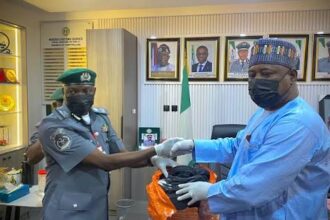The Diocese Sokoto, Bishop Mathew Kukah has dropped a message to express his sadness at the persecution of Christians in northern Nigeria.
While speaking during virtually during the Silver Jubilee Anniversary of the Order of the Knights of St. Mulumba Nigeria Eko Subordinate Council, Bishop Mathew noted that the numerous cases of violence against Christians is very disheartening, adding that list of these cases even go unpunished.
ATTENTION: Click “HERE” to join our WhatsApp group and receive News updates directly on your WhatsApp!
Citing examples such as killing of priests in Benue, as well as the fear of being identified as a Christian in the north.
He said;
“If you look at our country – Nigeria, the issue is that, in Northern Nigeria, Christians constitute some of the groups that you can kill without consequences. You can ask yourself has anybody ever been charged for burning churches or for destroying Christian properties. A pastor was slaughtered openly in Adamawa. People, priests were killed in Benue. Priests have been killed in Kaduna.
“It seems as if killing Christians is the only thing the world can do without consequences. That means that if you are serious as Christians, Catholics, what happens to the church in Ikwerre, what happens to the church in Sokoto, what happens to the church in Onitsha, what happens to the church everywhere in this country should affect us. Tragically, you know, Christianity has become largely subordinated to ethnicity.
Also Read:Police Foil Ammunition Smuggling Plot in Nasarawa
“Many people today still have a caliphate mentality that those who are not part of us must be against us. And this is the fate of Christians and Christianity in many parts of Northern Nigeria today, where Christianity is being tolerated. Christians are being denied lands to build churches, and it is not seen as a problem. In a place like Kenya, I have a problem of that nature right now as we talk.
“We must preach the gospel, welcome or unwelcome. Preaching the gospel has no political and ethnic boundaries. It is not about friendship. If it is about friendship, Jesus would have said to Peter, get behind me. When we are confronted, martyrdom is not just about being killed. Because, of course, in the end, you are killed for speaking the truth. I remember in the days of Abacha, many times people used to say to me, oh Bishop, if you don’t keep quiet, you will be killed for nothing.
“I am saying so because we now need to come to terms with the essence that every day of our lives as Christians, we are challenged to martyrdom. Martyrdom because a sword is dangling before us. Martyrdom because we have a country, we have a society, we have a world that is so morally broken that every day the whole question of what is right and what is wrong has been circumscribed by the circumstances in which we find ourselves. When martyrdom comes to us, we embrace it, we are not in retreat.
“The challenge, therefore, is for us to come to terms with these realities and how they can be addressed. Here in Sokoto, for example, I have lost a seminarian, I have lost a priest, my priests have been kidnapped, not once, not twice. But my immediate reaction is that in all of this, we are only inspired. People look at me and they say to me, why are you going back to Sokoto? I remember when Deborah was killed, I was out of Sokoto. People were saying to me, how are you going back to Sokoto? When my seminarian, my priest, was kidnapped and released last month, people asked if I was still going back to Sokoto.”
Despite the risks, Bishop Kukah reaffirmed his commitment to his ministry in Sokoto, underscoring his belief that the Christian mission must continue in the face of adversity.

